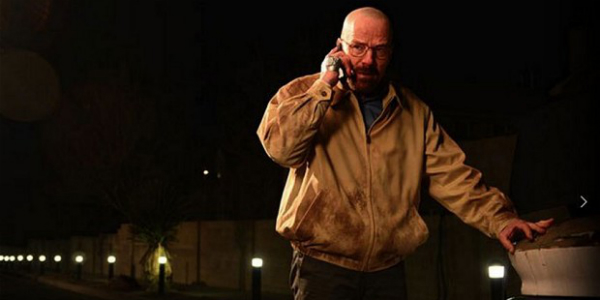Breaking Bad's Ozymandias Was Not The Series' Greatest Episode

Your Daily Blend of Entertainment News
You are now subscribed
Your newsletter sign-up was successful
I've been using the 'break the bad news' pun way too much when writing about Breaking Bad, however, it probably fits this discussion more than all the others so here goes... I hate to break the bad news but "Ozymandias" is not the all-time greatest episode of TV. Not only is trying to pick the best one-hour in the history of the medium a silly exercise (although admittedly a fun one in which I'm obviously about to participate), it is especially silly in this case because last Sunday was not even the best episode of AMC's Emmy nominated drug drama. I'm aware of the seemingly contradictory nature of the last statement but arguing about a single series' greatest installment is a much more realistic (although equally fruitless) venture than comparing one hour (42-45 minutes) with the millions of others from different eras or genres or network limitations or... you get it.
And yet, even though there are many reasons why selecting a 'best' isn't a worthwhile discussion when it comes to the arts (sorry, awards shows), I'm here to offer a few reasons why "Ozymandias" shouldn't be included when, like this, they inevitably occur. Another important thing to remember is that in no way am I suggesting that "Ozymandias" was an average episode of television. It was phenomenal. And a welcome entry in any best of Breaking Bad conversation thanks to the Rian Johnson's compelling direction, the always excellent performances and a story that included the most emotional loss of the entire series. So far. But was it as good as "Crawl Space" (S4, E11) or "Dead Freight" (S5, E5)? I don't think so. And the fact that it's even up for debate should put declaring last week the all time greatest in television history into perspective as well as highlight the absurdity of making such lists.
After we've had some more time to digest the show's intense homestretch, I think people will agree that Breaking Bad's finest run was from Season 4 to the end of Season 5A. But, for the sake of argument, let's say that the third last installment of the drama really is the best of the series then how does it compare to the other recent greats? Is it as devastating or thematically sound as The Wire's "Cleaning Up" (S1, E12)? As daring as The Sopranos' "Funhouse" (S2, E13)? As compelling as The West Wing's "Two Cathedrals" (S2, E22)? As bold and captivating as LOST's pilot? Or as emotional as Buffy the Vampire Slayer's "The Body" (S5, E16)? I don't think "Ozymandias" is as good as any of those and they're (not only all from my lifetime but) not even widely considered to be the best in their respective series. They're just the ones, like "Crawl Space," that left the most lasting impression.

I guess I should probably provide some episode specifics to back up this probably unpopular opinion, so let's start at the beginning with the third last installment's cold open. Experimenting in the pre-title sequence is one of the series' defining features but occasionally they work better in concept than execution as was the case with "Ozymandias." I completely understand the reasoning behind having the flashback, letting the audience see the old Walt and how far he's come as well as inserting a 'performance' based phone call with Skyler to compliment the epic one near the end of the episode but it simply didn't play well on-screen. The intellectual ideas behind a scene mean nothing if it doesn't work dramatically and the cold open just kind of sits there. It's something we've seen on the show now a hundred times. Johnson does his best to make it visually interesting but the actors also look so different (and the makeup was not great) that it was just distracting.
I know they wanted to include the bit about Holly to really bring the point home, however, it might have been more effective if they had just used one of the old scenes of Walt making excuses to Skyler while out on a cook with Jesse (that might have made it seem like the audience's memories of the show and therefore create an emotional connection) or, well, have the episode open with Hank's unforgettable send off in the desert. No harm in picking up right where you left off when telling such an intensely focused narrative, especially if it's not really going to payoff later. Speaking of the scene in the desert and payoffs, I also was not fond of the way that the truth about Jane came to light. The writers, of course, painted themselves into a corner with that from the beginning because the only way it could come out would have to be from Walt's own admission. He's the only one who knew and it had to come out. I'd argue that it's enough that we know but Chekhov's gun says otherwise.
Those are pretty much the only complaints I had when it came to the otherwise spectacular episode of Breaking Bad. Everything else was really well done and I know that even these are relatively minor. This whole thing probably reads as whiny nitpicking but it's important to not declare every excellent example of something the greatest one ever. It seems like every new performance by an acclaimed actor is always his or her best yet. New films are constantly hailed as the greatest this or that of all time or a certain director's best work. Hyperbole abounds. An instant, blurb culture. The next tweet. And it's hard to contextualize in 140 characters. Ask Game of Thrones. Kidding. That's the greatest show of all time!
Oh, but I will concede that Cranston reading "Ozymandias" by Percy Bysshe Shelley may be the best television promo of all time...
Your Daily Blend of Entertainment News
Breaking Bad returns with “Granite Slate,” the penultimate episode of the show, next Sunday at 9 p.m. ET on AMC. Created by Vince Gilligan, the series stars Bryan Cranston, Aaron Paul, Anna Gunn, Dean Norris, Betsy Brandt, R.J. Mitte, Jesse Plemons and Bob Odenkirk.
